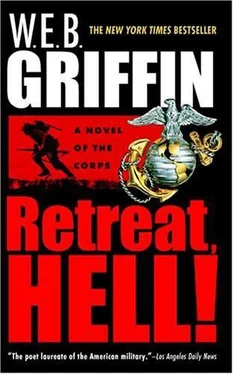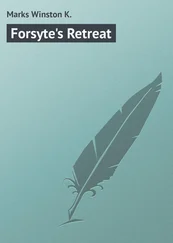Orders were waiting for him when he reported into Camp Pendleton the night of 1 July 1950, but not the Thank you for your service, and don't let the doorknob hit you in the ass on your way out ones he expected, which would have ordered him to his home of official record.
Eight hours after reporting into Camp Pendleton—early the next morning— he had found himself sitting in the backseat of an Air Force F-94 taking off from Naval Air Station Miramar. He was traveling on orders bearing the code of the highest priority in the Armed Forces: DP. It stood for "By Direction of the President."
In Washington, he found out what had happened to the analysis he couldn't bring himself to burn.
Pickering had taken it to Rear Admiral Roscoe Hillencoetter, the Director of the Central Intelligence Agency, which had taken the place of the OSS. Hillencoetter had told Fleming Pickering that he didn't believe the analysis, but— Pickering had come to his office accompanied by Senator Richardson K. Fowler, and Pickering had been the Assistant Director of the OSS for Asia—he said he would look into it.
Before that could happen, the North Koreans invaded South Korea.
When President Harry S Truman had demanded of Admiral Hillencoetter, in effect, "You mean to tell me you had absolutely no idea the North Koreans were going to do this?" the admiral had replied that there was one thing, and told him that the World War II Director of the OSS for Asia, the shipping magnate Fleming Pickering, had come to his office with Senator Fowler carrying an analysis written by a Marine captain predicting the North Korean invasion was inevitable.
The President had had some trouble getting Pickering on the telephone in the penthouse of the Foster San Franciscan Hotel on Nob Hill.
When the operator said, "General Pickering, please, the President is calling," it had been difficult to convince Mrs. Patricia Pickering that it wasn't one of her husband's drinking buddies thinking he was clever.
But eventually the President got through, and shortly thereafter—after a cross-country flight in an F-94—Pickering found himself facing the President of the United States in the Foster Lafayette hotel suite of his friend, and Truman's bitter political enemy, Senator Richardson K. Fowler, Republican of California.
After first demanding of the President that he give his word that no harm would come to Captain McCoy for his having turned his analysis over to him, Pickering told the President as much as he knew.
When he had finished, the President said, in effect, "I gave you my word because I wanted to, not because I had to."
Then he picked up the telephone, asked to be connected with the Commandant of the Marine Corps, and when, in less than sixty seconds, that officer came on the line, said, "This is the President, General. I understand you're acquainted with Brigadier General Fleming Pickering, USMC Reserve?"
There was a very short pause while the Commandant said, "Yes, sir."
'Please cause the necessary orders to be issued calling the general to active service for an indefinite period, effective immediately, and further placing him on duty with the Central Intelligence Agency," Truman ordered. "It won't be necessary to notify him; he's with me now."
The President had hung up and then turned to General Pickering.
"So far as this Captain McCoy is concerned, I've ordered that he be brought here as soon as he can be located. I want to see him myself."
Within days, Brigadier General Pickering, Captain McCoy, and Master Gunner Zimmerman were on a plane for Tokyo. The President had told Admiral Hillencoetter it was pretty obvious to him that a very good way to find out what had gone wrong with CIA intelligence-gathering procedures in the Far East—and to make sure the situation was corrected—was to send the man who'd run Far Eastern Operations for the OSS during World War II back over there.
General Pickering was named Assistant Director of the CIA for Asia.
This time Ernie had not sat dutifully and docilely at home while her husband went to war. They had been in Tokyo only a few days when there was a message saying Mrs. Kenneth McCoy would arrive in Tokyo aboard Trans-Global Airways Flight 4344 at ten the next morning.
She was now residing at No. 7 Saku-Tun, in the Denenchofu section of Tokyo, Japan. And she had told her husband that she had not only deceived him when they had been stationed in Tokyo—she had told him that she had found a very nice house at a rent they could afford that would keep them out of the small quarters they would have been given by the Navy, when the facts were she had bought the house—but also that, since the Marine Corps had already let him know what they really thought of him, she had no intention of pretending any longer that they had only his pay to live on.
"Don't give me any trouble about this, Ken," she'd said firmly. "You're not supposed to upset a pregnant woman."
Ernie was in the sixth month of her pregnancy. Twice before, she had failed to carry to full term.
Major Ken McCoy had thought, as Ernie had stood before him, hands on her hips, her stomach just starting to show, making her declaration, that he loved her even more now than when he had first seen her on the patio of the penthouse, when it had really been Love at First Sight.
McCoy walked away from the base operations tents, and Jeanette Priestly had to trot to catch up with him.
"Where are they going?" she asked, indicating the car with Generals Howe and Almond in it.
"I thought you wanted to hear about Pick," McCoy replied.
She didn't reply, but caught his arm and stopped him.
He looked back at the tent, decided they were out of earshot, and stopped and told her everything he knew.
"So you think he's alive?" she asked when he had finished.
He nodded.
"He was yesterday, I'm sure of it."
"So when are you going to look again?"
"You mean instead of standing around here waiting for El Supremo?"
She nodded.
"Well, for one thing, I was ordered to be here," he said. "And for another, I have no idea where he is. There's no sense going back south until I do."
"And when will that be?"
"Whenever there's another sighting of his arrows," McCoy said. "Billy Dunn was here early this morning, and he said he's going to photograph the hell out of the area where we just missed him. He'll almost certainly come up with something, and when he does, we'll go out again."
"When you go, can I go with you?"
"No, of course not. And if you try something clever, I'll have you on the next plane to Tokyo."
"You'd do that, too, wouldn't you, you sonofabitch?"
"You know I would, and stop calling me a sonofabitch."
She met his eyes.
"It's a term of endearment," she said. "I love you almost as much as I love that stupid bastard who got himself shot down."
She stood on her toes and kissed his cheek.
For a moment—just a moment—McCoy put his arms around her and hugged her.
[FOUR]
The Bataan made its landing approach from the direction of Seoul, passed low over the people gathered around the base operations tents, and touched down.
The military police had permitted a dozen still and motion picture photographers to detach themselves from the press area so that they would be able to photograph the Bataan taxiing up to base operations and the Supreme Commander himself getting off the airplane.
When the Bataan, instead of taxiing toward them, turned off the runway and taxied to a hangar on the far side of the field, a chorus of questions and protests rose from the Fourth Estate.
The phrase "Now, what the fuck is going on?" was heard, and several variations thereof.
The X Corps information officer, a bird colonel, who really had no idea what the hell was going on, managed to placate them somewhat by stating that it was "a security precaution" and that the Bataan and General MacArthur would shortly move to base operations.
Читать дальше












